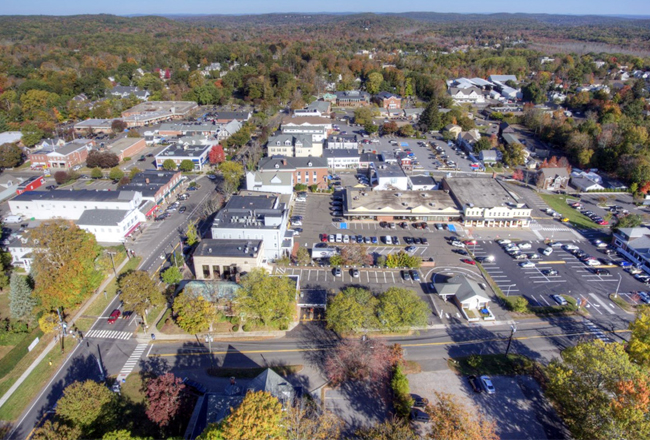Ridgefield businesses hold steady during pandemic
Ridgefield”™s business community for the most part retained its employee base during the worst of the COVID-19 pandemic and grew online sales when brick-and-mortar operations were shut down, according to a new study released by the Ridgefield Economic & Community Development Commission (ECDC).
The study, which was conducted with the COVID Ridgefield Recovery Committee, polled 145 businesses and nonprofits that were based in three categories: professional services, restaurants and retail, and the combined arts/culture and fitness/recreation sector.

Top: Aerial view of Ridgefield”™s Central Business District. Photo by Aerial360 Solutions.
The survey found 62% of respondents maintained a flat staffing level during the pandemic while 5% increased their workforce. However, 33% were forced to make cuts as a result of the pandemic”™s impact on the local economy. But looking ahead over the next six months, 60% of respondents said there would be no reduction in their workforce, with 10% predicting job cuts and 30% claiming they were unsure.
ECDC Chairman Geoffrey Morris credited Ridgefield”™s business community for pulling through via a combination of federal aid and proactive outreach to customers.
“Some of it has to do with PPP (Paycheck Protection Program), no question,” he said. “But also, people were able to keep business going by moving things online and continuing to be in touch with customers while saying, ”˜Shop local, come support us.”™”
E-commerce certainly helped during this time ”” roughly one-third of respondents said online activity accounted for all of their sales during the shutdown period. In comparison, the online sales component accounted for less than 10% of total revenues for 80% of respondents. Nonetheless, 76% of respondents saw their revenues decrease during the pandemic, though 24% said they experienced an increase.
Morris believed Ridgefield”™s business community was emerging from the pandemic with cautious confidence.
“I would say given the national climate, I think the business mood and morale is pretty good with a lot of trepidation,” he said. “In other words, people are moving along nicely. The closing and the reopening were smooth, but revenues are down. And there is a huge potential cliff in front of people if the whole COVID thing goes bad again.”
As for a pandemic reprise, 62% of respondents said they would be able to survive another shutdown, either through self-financing or with some form of financial assistance, while 38% were either unsure or believed another shutdown would be fatal to their operations.
ECDC Commissioner Bob Knight, said that the current socioeconomic state is requiring businesses to meet unprecedented challenges without pausing to shudder.
“We”™re living in interesting times ”” we”™re simultaneously gone through the Spanish flu, the Great Depression, and the civil rights movement,” he said. “And there”™s a sense in the business community that things are moving quickly and you have to adapt. Our businesses that embraced more of an online sales presence are actually doing pretty well. And those who have innovated and are taking a fresh look are doing okay. We”™re encouraging more businesses to do the same.”
As the pandemic began to disrupt the economy, Morris noted the ECDC worked with businesses regarding health issues and navigating the process of obtaining financial assistance to stay operational. Morris also praised First Selectman Rudy Marconi for being “very active in the community and talking directly with a lot of businesses.”
Still, challenges remain, including a conspicuous number of retail vacancies along Main Street in the heart of Ridgefield”™s central business district. Morris asserted the post-pandemic focus of the ECDC will include strengthening the retail environment with new businesses, and he observed that retail trends appear to be favoring the Main Street experience.
“When you look nationally at the impact of the pandemic on malls, you could see a lot of banks winding up owning malls,” he said. “It”™s anticipated that that several malls nationally are going to close. They”™re creating opportunities for more ”˜shop local”™ campaigns ”” and people are thinking more locally, anyway. And if there”™s less opportunity to go to a mall, there”™s going to be greater opportunity to come locally.”
“It”™s also an opportunity for a town like Ridgefield to start having a conversation about the types of retail that we”™re going to be looking for in the medium-term and maybe even long-term,” Knight said. “Does that mean we need to embrace more national types of retailers or we continue to embrace more local retail? We”™re starting to have those conversations now.”
Confident of Ridgefield”™s business future, Morris noted a new wave of residents eager to make their homes in town would also be taking advantage of local businesses.
“Look at our residential real estate market right now, it”™s absolutely booming,” he said. “You can”™t find a rental anywhere and housing, especially high-end housing, is off the shelves very quickly. “We”™re having an influx of new residents and young families. There are new opportunities that are coming up now.”